高中英语语法之26省略
图片预览
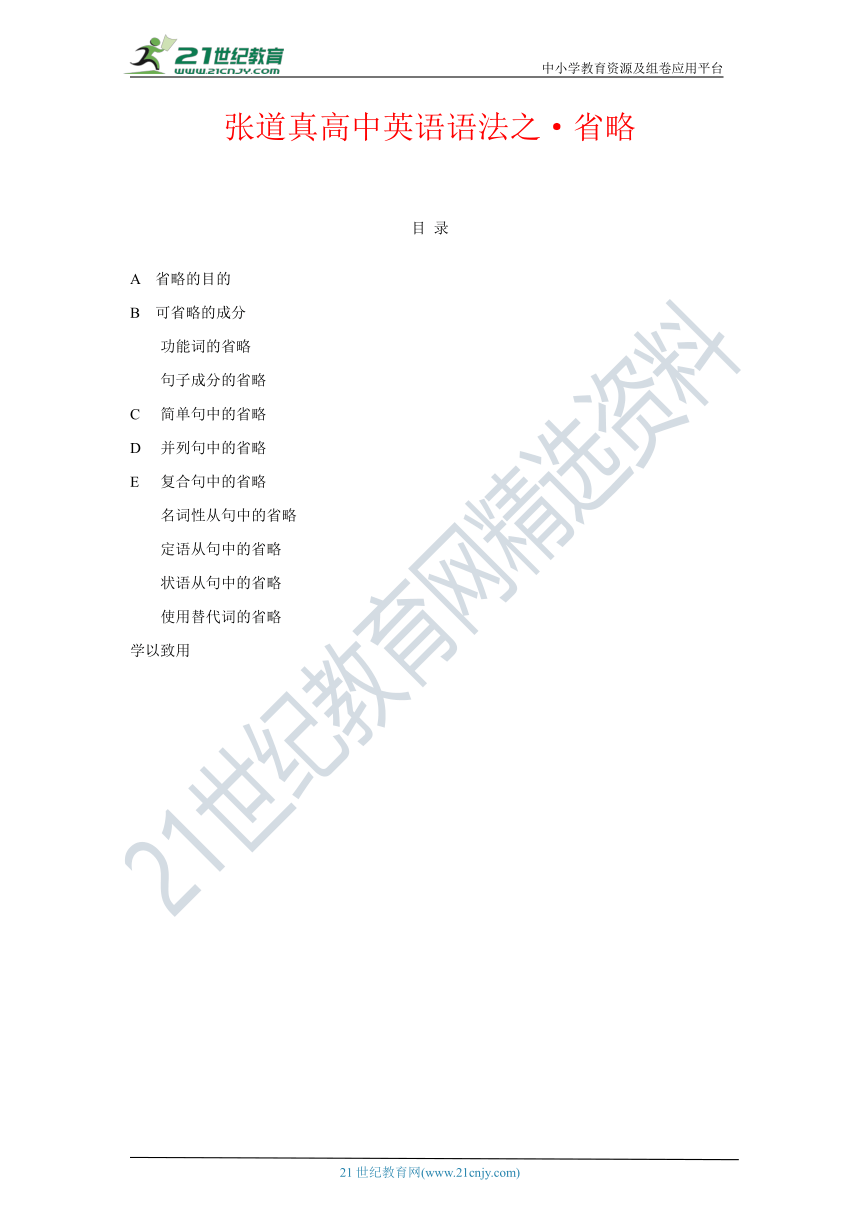
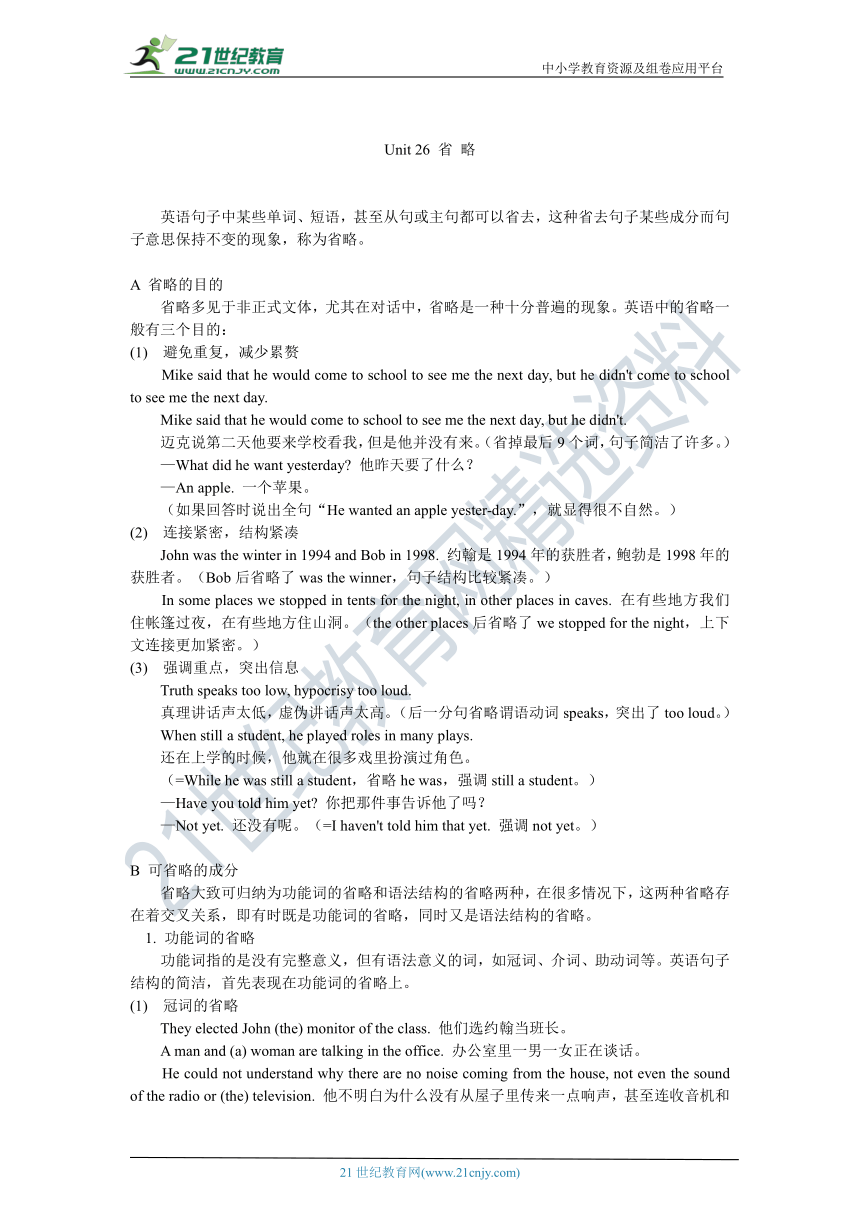
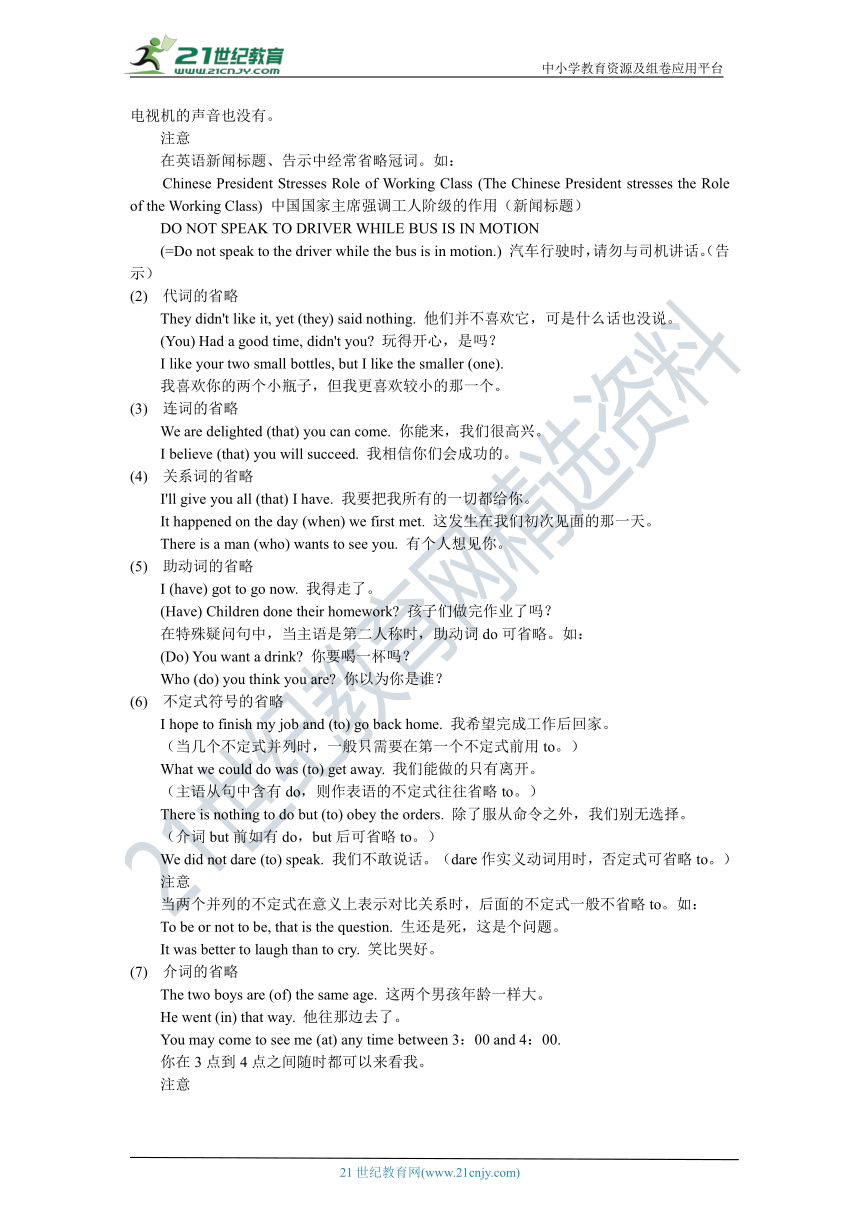
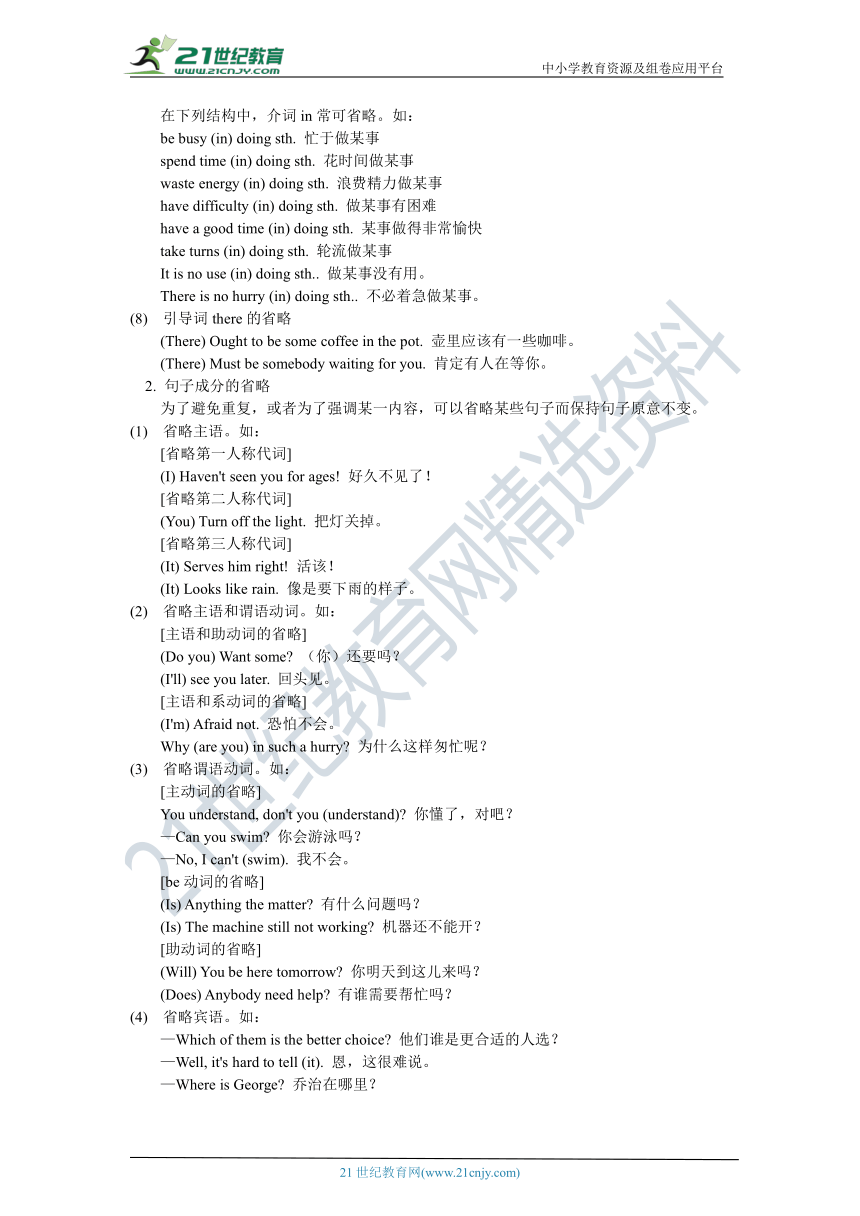
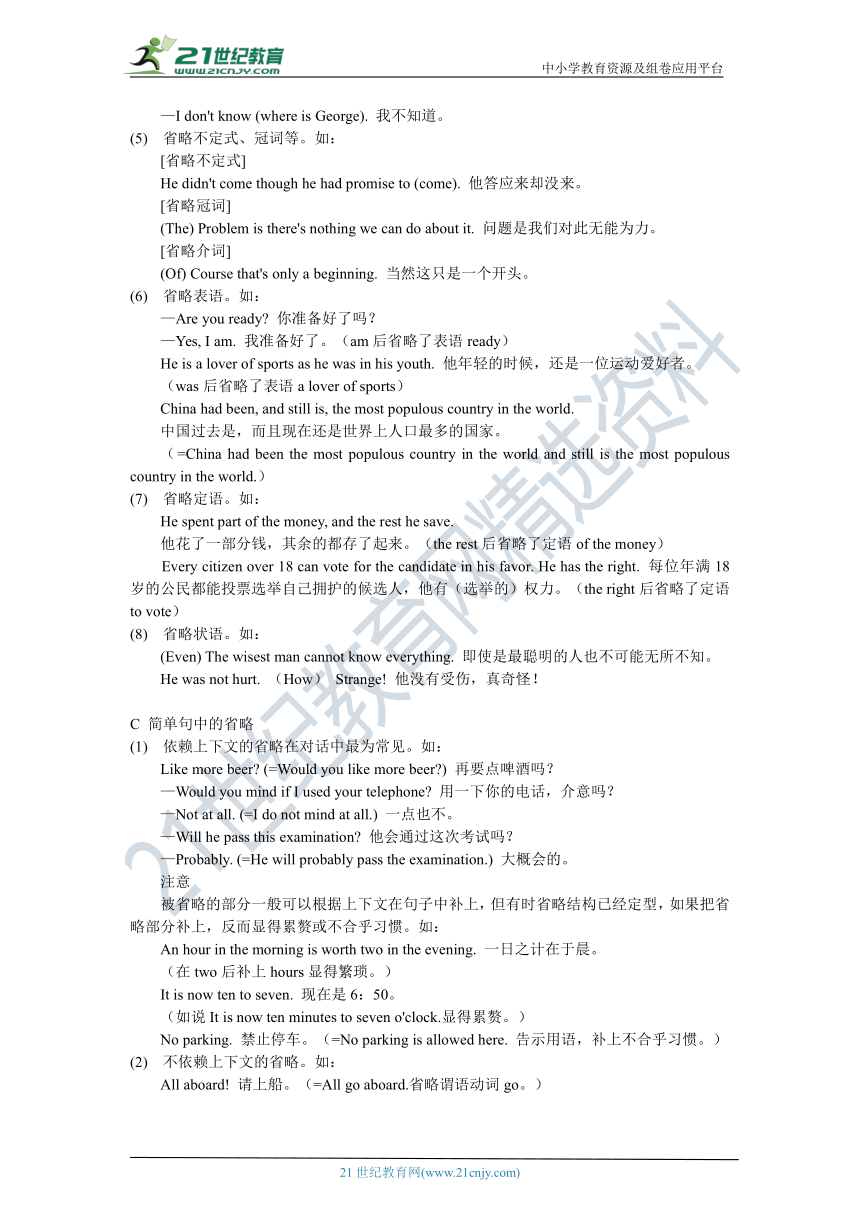
文档简介
中小学教育资源及组卷应用平台
张道真高中英语语法之·省略
目 录
A 省略的目的
B 可省略的成分
功能词的省略
???? 句子成分的省略
C 简单句中的省略
D 并列句中的省略
E 复合句中的省略
???? 名词性从句中的省略
???? 定语从句中的省略
???? 状语从句中的省略
???? 使用替代词的省略
学以致用
Unit 26 省 略
英语句子中某些单词、短语,甚至从句或主句都可以省去,这种省去句子某些成分而句子意思保持不变的现象,称为省略。2-1-c-n-j-y
A 省略的目的
省略多见于非正式文体,尤其在对话中,省略是一种十分普遍的现象。英语中的省略一般有三个目的:
(1) 避免重复,减少累赘
Mike said that__he_wo_uld come to school to see me the next day, but he didn't come to school to see me the next day.
Mike sai_d_that_ he would come to school to see me the next day, but he didn't.
迈克说第二天他要来学校看我,但是他并没有来。(省掉最后9个词,句子简洁了许多。)
—What did he want yesterday? 他昨天要了什么?
—An apple. 一个苹果。
(如果回答时说出全句“He wanted an apple yester-day.”,就显得很不自然。)
(2) 连接紧密,结构紧凑
John was _the_wi_nter in 1994 and Bob in 1998. 约翰是1994年的获胜者,鲍勃是1998年的获胜者。(Bob后省略了was the winner,句子结构比较紧凑。)
In some pla_ces_we_ stopped in tents for the night, in other places in caves. 在有些地方我们住帐篷过夜,在有些地方住山洞。(the other places后省略了we stopped for the night,上下文连接更加紧密。)
(3) 强调重点,突出信息
Truth speaks too low, hypocrisy too loud.
真理讲话声太低,虚伪讲话声太高。(后一分句省略谓语动词speaks,突出了too loud。)
When still a student, he played roles in many plays.
还在上学的时候,他就在很多戏里扮演过角色。
(=While he was still a student,省略he was,强调still a student。)
—Have you told him yet? 你把那件事告诉他了吗?
—Not yet. 还没有呢。(=I haven't told him that yet. 强调not yet。)
B 可省略的成分
省略大致可归纳为功能词的_?????????è????????_构的省略两种,在很多情况下,这两种省略存在着交叉关系,即有时既是功能词的省略,同时又是语法结构的省略。
1. 功能词的省略
功能词指的是没有完整意义,但有语法意义的词,如冠词、介词、助动词等。英语句子结构的简洁,首先表现在功能词的省略上。
(1) 冠词的省略
They elected John (the) monitor of the class. 他们选约翰当班长。
A man and (a) woman are talking in the office. 办公室里一男一女正在谈话。
He could__not_u_nderstand why there are no noise coming from the house, not even the sound of the radio or (the) television. 他不明白为什么没有从屋子里传来一点响声,甚至连收音机和电视机的声音也没有。
注意
在英语新闻标题、告示中经常省略冠词。如:
Chinese Presid_ent_St_resses Role of Working Class (The Chinese President stresses the Role of the Working Class) 中国国家主席强调工人阶级的作用(新闻标题)
DO NOT SPEAK TO DRIVER WHILE BUS IS IN MOTION
(=Do not speak _to_the_ driver while the bus is in motion.) 汽车行驶时,请勿与司机讲话。(告示)
(2) 代词的省略
They didn't like it, yet (they) said nothing. 他们并不喜欢它,可是什么话也没说。
(You) Had a good time, didn't you? 玩得开心,是吗?
I like your two small bottles, but I like the smaller (one).
我喜欢你的两个小瓶子,但我更喜欢较小的那一个。
(3) 连词的省略
We are delighted (that) you can come. 你能来,我们很高兴。
I believe (that) you will succeed. 我相信你们会成功的。
(4) 关系词的省略
I'll give you all (that) I have. 我要把我所有的一切都给你。
It happened on the day (when) we first met. 这发生在我们初次见面的那一天。
There is a man (who) wants to see you. 有个人想见你。
(5) 助动词的省略
I (have) got to go now. 我得走了。
(Have) Children done their homework? 孩子们做完作业了吗?
在特殊疑问句中,当主语是第二人称时,助动词do可省略。如:
(Do) You want a drink? 你要喝一杯吗?
Who (do) you think you are? 你以为你是谁?
(6) 不定式符号的省略
I hope to finish my job and (to) go back home. 我希望完成工作后回家。
(当几个不定式并列时,一般只需要在第一个不定式前用to。)
What we could do was (to) get away. 我们能做的只有离开。
(主语从句中含有do,则作表语的不定式往往省略to。)
There is nothing to do but (to) obey the orders. 除了服从命令之外,我们别无选择。
(介词but前如有do,but后可省略to。)
We did not dare (to) speak. 我们不敢说话。(dare作实义动词用时,否定式可省略to。)
注意
当两个并列的不定式在意义上表示对比关系时,后面的不定式一般不省略to。如:
To be or not to be, that is the question. 生还是死,这是个问题。www.21-cn-jy.com
It was better to laugh than to cry. 笑比哭好。
(7) 介词的省略
The two boys are (of) the same age. 这两个男孩年龄一样大。
He went (in) that way. 他往那边去了。
You may come to see me (at) any time between 3:00 and 4:00. 21教育名师原创作品
你在3点到4点之间随时都可以来看我。
注意
在下列结构中,介词in常可省略。如:
be busy (in) doing sth. 忙于做某事
spend time (in) doing sth. 花时间做某事
waste energy (in) doing sth. 浪费精力做某事
have difficulty (in) doing sth. 做某事有困难
have a good time (in) doing sth. 某事做得非常愉快
take turns (in) doing sth. 轮流做某事
It is no use (in) doing sth.. 做某事没有用。
There is no hurry (in) doing sth.. 不必着急做某事。
(8) 引导词there的省略
(There) Ought to be some coffee in the pot. 壶里应该有一些咖啡。
(There) Must be somebody waiting for you. 肯定有人在等你。
2. 句子成分的省略
为了避免重复,或者为了强调某一内容,可以省略某些句子而保持句子原意不变。
(1) 省略主语。如:
[省略第一人称代词]
(I) Haven't seen you for ages! 好久不见了!
[省略第二人称代词]
(You) Turn off the light. 把灯关掉。
[省略第三人称代词]
(It) Serves him right! 活该!
(It) Looks like rain. 像是要下雨的样子。
(2) 省略主语和谓语动词。如:
[主语和助动词的省略]
(Do you) Want some? (你)还要吗?
(I'll) see you later. 回头见。
[主语和系动词的省略]
(I'm) Afraid not. 恐怕不会。
Why (are you) in such a hurry? 为什么这样匆忙呢?
(3) 省略谓语动词。如:
[主动词的省略]
You understand, don't you (understand)? 你懂了,对吧?
—Can you swim? 你会游泳吗?
—No, I can't (swim). 我不会。
[be动词的省略]
(Is) Anything the matter? 有什么问题吗?
(Is) The machine still not working? 机器还不能开?
[助动词的省略]
(Will) You be here tomorrow? 你明天到这儿来吗?
(Does) Anybody need help? 有谁需要帮忙吗?
(4) 省略宾语。如:
—Which of them is the better choice? 他们谁是更合适的人选?
—Well, it's hard to tell (it). 恩,这很难说。
—Where is George? 乔治在哪里?
—I don't know (where is George). 我不知道。
(5) 省略不定式、冠词等。如:
[省略不定式]
He didn't come though he had promise to (come). 他答应来却没来。
[省略冠词]
(The) Problem is there's nothing we can do about it. 问题是我们对此无能为力。
[省略介词]
(Of) Course that's only a beginning. 当然这只是一个开头。
(6) 省略表语。如:
—Are you ready? 你准备好了吗?
—Yes, I am. 我准备好了。(am后省略了表语ready)
He is a lover of sports as he was in his youth. 他年轻的时候,还是一位运动爱好者。
(was后省略了表语a lover of sports)
China had been, _and_st_ill is, the most populous country in the world.
中国过去是,而且现在还是世界上人口最多的国家。
(=China had be_en_the_ most populous country in the world and still is the most populous country in the world.)
(7) 省略定语。如:
He spent part of the money, and the rest he save.
他花了一部分钱,其余的都存了起来。(the rest后省略了定语of the money)
Every _citize_n over 18 can vote for the candidate in his favor. He has the right. 每位年满18岁的公民都能投票选举自己拥护的候选人,他有(选举的)权力。(the right后省略了定语to vote)
(8) 省略状语。如:
(Even) The wisest man cannot know everything. 即使是最聪明的人也不可能无所不知。
He was not hurt. (How) Strange! 他没有受伤,真奇怪!
C 简单句中的省略
(1) 依赖上下文的省略在对话中最为常见。如:
Like more beer? (=Would you like more beer?) 再要点啤酒吗?
—Would you mind if I used your telephone? 用一下你的电话,介意吗?
—Not at all. (=I do not mind at all.) 一点也不。
—Will he pass this examination? 他会通过这次考试吗?
—Probably. (=He will probably pass the examination.) 大概会的。
注意
被省略的部分一般可以根据上下文在句子中补上,但有时省略结构已经定型,如果把省略部分补上,反而显得累赘或不合乎习惯。如:
An hour in the morning is worth two in the evening. 一日之计在于晨。
(在two后补上hours显得繁琐。)
It is now ten to seven. 现在是6:50。
(如说It is now ten minutes to seven o'clock.显得累赘。)
No parking. 禁止停车。(=No parking is allowed here. 告示用语,补上不合乎习惯。)
(2) 不依赖上下文的省略。如:
All aboard! 请上船。(=All go aboard.省略谓语动词go。)
—What about having a game of chess? 下盘棋怎么样?
—Sounds l_ike_a__good idea. 听上去是个好主意。(=It sounds like a good idea. 省略主语it。)
Everybody appears well prepared. 看起来大家都准备好了。
(=Everybody appears to be well prepared.省略不定式to be。)
D 并列句中的省略
并列句中,如果前后分句有相_??????é?¨?????????_常可以省略掉,以避免重复。通常被省略的可以是主语、谓语、宾语或其他成分,也可以是句子成分的一部分。
(1) 省略出现在后一分句。如:
[省略主语]
John likes collecting stamps but (John) hates listening to music.
约翰喜欢集邮,但不喜欢听音乐。
[省略谓语动词]
Some boo_ks_are_ to be tasted, others (are) to be swallowed, and some few (are) to be chewed and digested. 有些书只需浅尝,有些可以吞咽,只有少数需要仔细咀嚼,慢慢品味。
[省略主语和助动词]
I have been _to_Bei_jing and (I have) seen the Great Wall. 我去过北京,见到了万里长城。
[省略作宾语的不定式]
I asked him to see the film, but he didn't want to (see the film).
我请他去看电影,但他不想去。
注意
为了避免重复,不定式可以省去与句子前面重复的动词,但不定式符号to必须保留。如:
—Will you join in the game? 你愿意参加这项活动吗?
—I'd be glad to (join in the game). 我很乐意参加。
I don't want to go there, but I had to (go there). 我不想去那里,但没办法。
(2) 省略出现在前一分句。如:
[前一分句省略了谓语动词和宾语]
We can (win tomo_rrow's_ match), and certainly will, win tomorrow's match.
我们能够,而且一定会在明天的比赛中获胜。
[前一分句省略了作宾语的不定式]
I wished (to find him), yet feared to find him. 我想找到他,但又怕找到他。
(3) 省略出现在前后两个分句。如:
They can (pay the full fee) and (they) should pay the full fee. 21世纪教育网版权所有
他们能够也应该支付全部费用。
I'll fly to (Guangzhou), but (I'll) drive back from Guangzhou. 【来源:21·世纪·教育·网】
我将坐飞机去广州,但开车回来。
E 复合句中的省略
1. 名词性从句中的省略
(1) 引导主语、宾语、表语等从句的连词that在口语、非正式文体或较短的句子中常常可以省略。如:
[主语从句]
It is a pity (that) he can't swim. 遗憾的是他不会游泳。
[宾语从句]
I think (that) things will improve. 我想情况会改善的。
[表语从句]
The fact is (that) I never liked him. 事实是,我从未喜欢过他。【出处:21教育名师】
(2) 在wh-从句中的省略。如:
Somebody has hidden my notebook, but I don't know who / why / where.
有人把我的笔记本藏起来了,但我不知道这是谁藏的/为什么要藏/藏在哪儿。
(句中省略了he has hidden my notebook)
Do you want to start a successful business? This book tells you how.
你想做一个成功的生意吗?这本书告诉你生意成功之道。
(句中省略了you start a successful business)
2. 定语从句中的省略
(1) 当关系代词在定语从句中作宾语或补语时,可以省略。如:
Those books (that) you lent me were very useful. 你借给我的那些书很有用。
The peop_le_(wh_o / that) you were talking to were Swedes. 和你交谈的那些人是瑞典人。
I am not the fool (that) you thought me to be. 我现在不是你以前所认为的傻瓜了。
(2) 在以there is,this is,it is,who is开头的句子里,作主语的关系代词可以省略。如:
There is someone at the door (who) wants to see you. 有个人在门口要见你。
Who was that (who) called a few minutes ago? 几分钟前,是谁打来的电话?
That's a thing (which) might happen to anyone. 这是任何人都可能发生的事。
(3) 如果定语从句中有“be+形容词短语”结构,则要省略关系代词和be,只保留形容词短语作后置定语。如:21·cn·jy·com
The man (w_ho_is)_ responsible for the safety of the passengers promised to consider the matter. 负责乘客安全的那个人答应考虑这个问题。
This is not a book (that is) suitable for publication. 这是一本不宜出版的书。
3. 状语从句中的省略
(1) 时间状语从句中的省略
如果从句中的主语和主句的主语_?????????è????????_句中的动词为be,则把从句中的主语和be一并省略。如果从句动词为“be+动词-ing或-ed形式,则把从句中的主语和助动词一并省略。如:21*cnjy*com
When (it is) t_aken_a_ccording to the instructions, the drug has no side effects.
若按说明服用,本药无任何副作用。
Whene_ver_(i_t is) possible, the children play outside. 如果可能的话,孩子们总在外边玩耍。
Metals exp_and_wh_en (they are) heated and contract when (they are) cooled. 金属热胀冷缩。
注意
由连词before和after引导的时间状语从句,如省略了主语和be之后,before和after就成了介词。如:
The old machine must be checked before used. (误)
The old machine must be checked before being used. (正)
The old machine must be checked before it is used. (正)这台机器在使用前必须检查。
He told me the truth after asked three times. (误)
He told me the truth after being asked three times. (正)
He told _me_the_ truth after he was asked three times. (正)他问了三遍才告诉我真相。
(2) 方式状语从句中的省略
如果从句中的动词是“助动词be+动词-ing形式或-ed形式”,则将主语和助动词be一并省略。如:
She lay there, as though (she was) dead. 她躺在那儿,好像死了一样。
Ever_ything_ happened exactly as (it had been) expected. 一切的确像所预料地那样发生了。
(3) 条件状语从句中的省略
如果从句中含有“It+be_+??????è????????_构,则将it和be省略。如果从句中的动词为“助动词+动词-ed形式”,则将主语和助动词一并省略。如:
Correct the mistakes in the following sentences, if (there are) any.
如果下面的句子有错,请加以改正。
Englis_h_word_s are easily forgotten unless (they are) constantly repeated.
英语单词不经常重复是很容易被忘记的。
(4) 让步状语从句中的省略
当从句中的主语_??????????????????_语相同,而且从句的动词为be,则将从句的主语和be一并省略。在whatever或however引导的让步状语从句中,动词往往省略。如:
Frost is possi_ble,_t_hough (it is) not probable, even at the end of May.
甚至在五月底霜冻也是可能的,虽然可能性不太大。
Whatever the cause (may be), the result is certain. 不论原因是什么,结果是确定的。
I refused, however favourable the conditions (might be). 21教育网
不管条件多么优越,但他还是拒绝了。
(5) 比较状语从句中的省略
省略谓语的全部。如:
James enjoys the theatre more than Susan. 詹姆斯比苏珊更喜欢戏剧。
(Susan后省略了enjoys the theatre)
Tom has as many books as Jack. 汤姆有和杰克一样多的书。
(Jack后省略了has many books)
省略主语和谓语的一部分。如:
Brown speaks French as fluently as English. 布朗说法语和说英语一样流利。
(第二个as后省略了he speaks)
She was more angry than frightened. 与其说她害怕,倒不如说她生气。
(than后省略了she was)
省略表语部分。如:
Mrs White is not so young as she looks. 怀特夫人没有看上去那样年轻。
(looks后省略了young)
The situation is much more delicate than it seems. 情况要比表面上看起来微妙得多。
(seems后省略了delicate)
省略主语和谓语的大部分,保留状语。如:
He is working harder than before. 他现在比过去工作努力。
(than后省略了he worked hard)
There are as many students in our school as in their school. 21cnjy.com
我们学校的学生和他们学校的学生一样多。(as后省略了there are many students)
省略主语。如:
He drunk a _little_ more than was good for him. 他喝酒稍微有点过量。(than后省略了it)
省略宾语。如:
You spent more money than I had expected. 你花掉的钱比我预料得多。
(than后省略了that you should spend)
I was able to borrow as many books as I looked for. 我想要的许多书都能如数借到。
(第二个as后省略了what)
省略从句的全部。如:
You are getting slimmer. 你越来越苗条了。(slimmer后省略了than you were before)
It is not on_ly_bli_nd men who make such stupid mistakes. People who can see sometimes act just as foolishly. 不仅仅只是瞎子才犯如此愚蠢的错误。有时候,眼睛看得见的人也会做出同样的蠢事。(foolishly后省略了as blind men act)21·世纪*教育网
4. 使用替代词的省略
在省略句子某些成分时,有时还必须加上适当的替代词,如do,so,one等,以保持句子意思的完整性。【版权所有:21教育】
(1) do用来代替动词或动词和其他成分。如:
I know you better than he does. 我比他更了解你。(does替代knows you)
—Have you finished your work? 你完成你的工作了吗?
—Yes, I did yesterday. 是的,我昨天完成了。(did替代finished my work)
(2) so在expect,think,imagine,hope,suppose,believe等动词后面,代替单词、词组或句子。如:
She became a loyal friend to me and remains so.
她成了我的一个忠诚的朋友,而且一直如此。 (so替代a loyal friend)
—Has she ever been to London? 她曾经去过伦敦吗?
—I don't think so. 我想她没去过。(so替代she has ever been to London.)
(3) not代替否定的句子,用法和so相似。如:
—Will it rain tomorrow? 明天会下雨吗?
—I hope not. 我希望不会。(=I hope it won't rain tomorrow.)www-2-1-cnjy-com
—Can you come next week? 你下星期能来吗?
—I'm afraid not. 恐怕不能来。(=I'm afraid that I can't come.)
(4) the same一般指物,可代替词组或从句。如:
The mother swept the floor and her child did the same. 【来源:21cnj*y.co*m】
母亲扫地,孩子也跟着干。(the same代替动词词组swept the floor)
These orang_es_are_ just as sour as the last ones we had. They taste the same.
这些橘子和我们上次吃的一样酸,它们味道一样。
(the same代替从句as sour as the last ones we had)
(5) one是不定代词,常用来代替可数名词,其复数形式是ones。如:
I haven't got any books. Can you lend me one? 我没有书,你能借给我一本吗?
(one代替单数名词book)
The white dresses go with the hat better than the blue ones.
白色套装比蓝色套装更配这顶帽子。(ones代替复数名词dresses)
_21?????????è?????(www.21cnjy.com)_
张道真高中英语语法之·省略
目 录
A 省略的目的
B 可省略的成分
功能词的省略
???? 句子成分的省略
C 简单句中的省略
D 并列句中的省略
E 复合句中的省略
???? 名词性从句中的省略
???? 定语从句中的省略
???? 状语从句中的省略
???? 使用替代词的省略
学以致用
Unit 26 省 略
英语句子中某些单词、短语,甚至从句或主句都可以省去,这种省去句子某些成分而句子意思保持不变的现象,称为省略。2-1-c-n-j-y
A 省略的目的
省略多见于非正式文体,尤其在对话中,省略是一种十分普遍的现象。英语中的省略一般有三个目的:
(1) 避免重复,减少累赘
Mike said that__he_wo_uld come to school to see me the next day, but he didn't come to school to see me the next day.
Mike sai_d_that_ he would come to school to see me the next day, but he didn't.
迈克说第二天他要来学校看我,但是他并没有来。(省掉最后9个词,句子简洁了许多。)
—What did he want yesterday? 他昨天要了什么?
—An apple. 一个苹果。
(如果回答时说出全句“He wanted an apple yester-day.”,就显得很不自然。)
(2) 连接紧密,结构紧凑
John was _the_wi_nter in 1994 and Bob in 1998. 约翰是1994年的获胜者,鲍勃是1998年的获胜者。(Bob后省略了was the winner,句子结构比较紧凑。)
In some pla_ces_we_ stopped in tents for the night, in other places in caves. 在有些地方我们住帐篷过夜,在有些地方住山洞。(the other places后省略了we stopped for the night,上下文连接更加紧密。)
(3) 强调重点,突出信息
Truth speaks too low, hypocrisy too loud.
真理讲话声太低,虚伪讲话声太高。(后一分句省略谓语动词speaks,突出了too loud。)
When still a student, he played roles in many plays.
还在上学的时候,他就在很多戏里扮演过角色。
(=While he was still a student,省略he was,强调still a student。)
—Have you told him yet? 你把那件事告诉他了吗?
—Not yet. 还没有呢。(=I haven't told him that yet. 强调not yet。)
B 可省略的成分
省略大致可归纳为功能词的_?????????è????????_构的省略两种,在很多情况下,这两种省略存在着交叉关系,即有时既是功能词的省略,同时又是语法结构的省略。
1. 功能词的省略
功能词指的是没有完整意义,但有语法意义的词,如冠词、介词、助动词等。英语句子结构的简洁,首先表现在功能词的省略上。
(1) 冠词的省略
They elected John (the) monitor of the class. 他们选约翰当班长。
A man and (a) woman are talking in the office. 办公室里一男一女正在谈话。
He could__not_u_nderstand why there are no noise coming from the house, not even the sound of the radio or (the) television. 他不明白为什么没有从屋子里传来一点响声,甚至连收音机和电视机的声音也没有。
注意
在英语新闻标题、告示中经常省略冠词。如:
Chinese Presid_ent_St_resses Role of Working Class (The Chinese President stresses the Role of the Working Class) 中国国家主席强调工人阶级的作用(新闻标题)
DO NOT SPEAK TO DRIVER WHILE BUS IS IN MOTION
(=Do not speak _to_the_ driver while the bus is in motion.) 汽车行驶时,请勿与司机讲话。(告示)
(2) 代词的省略
They didn't like it, yet (they) said nothing. 他们并不喜欢它,可是什么话也没说。
(You) Had a good time, didn't you? 玩得开心,是吗?
I like your two small bottles, but I like the smaller (one).
我喜欢你的两个小瓶子,但我更喜欢较小的那一个。
(3) 连词的省略
We are delighted (that) you can come. 你能来,我们很高兴。
I believe (that) you will succeed. 我相信你们会成功的。
(4) 关系词的省略
I'll give you all (that) I have. 我要把我所有的一切都给你。
It happened on the day (when) we first met. 这发生在我们初次见面的那一天。
There is a man (who) wants to see you. 有个人想见你。
(5) 助动词的省略
I (have) got to go now. 我得走了。
(Have) Children done their homework? 孩子们做完作业了吗?
在特殊疑问句中,当主语是第二人称时,助动词do可省略。如:
(Do) You want a drink? 你要喝一杯吗?
Who (do) you think you are? 你以为你是谁?
(6) 不定式符号的省略
I hope to finish my job and (to) go back home. 我希望完成工作后回家。
(当几个不定式并列时,一般只需要在第一个不定式前用to。)
What we could do was (to) get away. 我们能做的只有离开。
(主语从句中含有do,则作表语的不定式往往省略to。)
There is nothing to do but (to) obey the orders. 除了服从命令之外,我们别无选择。
(介词but前如有do,but后可省略to。)
We did not dare (to) speak. 我们不敢说话。(dare作实义动词用时,否定式可省略to。)
注意
当两个并列的不定式在意义上表示对比关系时,后面的不定式一般不省略to。如:
To be or not to be, that is the question. 生还是死,这是个问题。www.21-cn-jy.com
It was better to laugh than to cry. 笑比哭好。
(7) 介词的省略
The two boys are (of) the same age. 这两个男孩年龄一样大。
He went (in) that way. 他往那边去了。
You may come to see me (at) any time between 3:00 and 4:00. 21教育名师原创作品
你在3点到4点之间随时都可以来看我。
注意
在下列结构中,介词in常可省略。如:
be busy (in) doing sth. 忙于做某事
spend time (in) doing sth. 花时间做某事
waste energy (in) doing sth. 浪费精力做某事
have difficulty (in) doing sth. 做某事有困难
have a good time (in) doing sth. 某事做得非常愉快
take turns (in) doing sth. 轮流做某事
It is no use (in) doing sth.. 做某事没有用。
There is no hurry (in) doing sth.. 不必着急做某事。
(8) 引导词there的省略
(There) Ought to be some coffee in the pot. 壶里应该有一些咖啡。
(There) Must be somebody waiting for you. 肯定有人在等你。
2. 句子成分的省略
为了避免重复,或者为了强调某一内容,可以省略某些句子而保持句子原意不变。
(1) 省略主语。如:
[省略第一人称代词]
(I) Haven't seen you for ages! 好久不见了!
[省略第二人称代词]
(You) Turn off the light. 把灯关掉。
[省略第三人称代词]
(It) Serves him right! 活该!
(It) Looks like rain. 像是要下雨的样子。
(2) 省略主语和谓语动词。如:
[主语和助动词的省略]
(Do you) Want some? (你)还要吗?
(I'll) see you later. 回头见。
[主语和系动词的省略]
(I'm) Afraid not. 恐怕不会。
Why (are you) in such a hurry? 为什么这样匆忙呢?
(3) 省略谓语动词。如:
[主动词的省略]
You understand, don't you (understand)? 你懂了,对吧?
—Can you swim? 你会游泳吗?
—No, I can't (swim). 我不会。
[be动词的省略]
(Is) Anything the matter? 有什么问题吗?
(Is) The machine still not working? 机器还不能开?
[助动词的省略]
(Will) You be here tomorrow? 你明天到这儿来吗?
(Does) Anybody need help? 有谁需要帮忙吗?
(4) 省略宾语。如:
—Which of them is the better choice? 他们谁是更合适的人选?
—Well, it's hard to tell (it). 恩,这很难说。
—Where is George? 乔治在哪里?
—I don't know (where is George). 我不知道。
(5) 省略不定式、冠词等。如:
[省略不定式]
He didn't come though he had promise to (come). 他答应来却没来。
[省略冠词]
(The) Problem is there's nothing we can do about it. 问题是我们对此无能为力。
[省略介词]
(Of) Course that's only a beginning. 当然这只是一个开头。
(6) 省略表语。如:
—Are you ready? 你准备好了吗?
—Yes, I am. 我准备好了。(am后省略了表语ready)
He is a lover of sports as he was in his youth. 他年轻的时候,还是一位运动爱好者。
(was后省略了表语a lover of sports)
China had been, _and_st_ill is, the most populous country in the world.
中国过去是,而且现在还是世界上人口最多的国家。
(=China had be_en_the_ most populous country in the world and still is the most populous country in the world.)
(7) 省略定语。如:
He spent part of the money, and the rest he save.
他花了一部分钱,其余的都存了起来。(the rest后省略了定语of the money)
Every _citize_n over 18 can vote for the candidate in his favor. He has the right. 每位年满18岁的公民都能投票选举自己拥护的候选人,他有(选举的)权力。(the right后省略了定语to vote)
(8) 省略状语。如:
(Even) The wisest man cannot know everything. 即使是最聪明的人也不可能无所不知。
He was not hurt. (How) Strange! 他没有受伤,真奇怪!
C 简单句中的省略
(1) 依赖上下文的省略在对话中最为常见。如:
Like more beer? (=Would you like more beer?) 再要点啤酒吗?
—Would you mind if I used your telephone? 用一下你的电话,介意吗?
—Not at all. (=I do not mind at all.) 一点也不。
—Will he pass this examination? 他会通过这次考试吗?
—Probably. (=He will probably pass the examination.) 大概会的。
注意
被省略的部分一般可以根据上下文在句子中补上,但有时省略结构已经定型,如果把省略部分补上,反而显得累赘或不合乎习惯。如:
An hour in the morning is worth two in the evening. 一日之计在于晨。
(在two后补上hours显得繁琐。)
It is now ten to seven. 现在是6:50。
(如说It is now ten minutes to seven o'clock.显得累赘。)
No parking. 禁止停车。(=No parking is allowed here. 告示用语,补上不合乎习惯。)
(2) 不依赖上下文的省略。如:
All aboard! 请上船。(=All go aboard.省略谓语动词go。)
—What about having a game of chess? 下盘棋怎么样?
—Sounds l_ike_a__good idea. 听上去是个好主意。(=It sounds like a good idea. 省略主语it。)
Everybody appears well prepared. 看起来大家都准备好了。
(=Everybody appears to be well prepared.省略不定式to be。)
D 并列句中的省略
并列句中,如果前后分句有相_??????é?¨?????????_常可以省略掉,以避免重复。通常被省略的可以是主语、谓语、宾语或其他成分,也可以是句子成分的一部分。
(1) 省略出现在后一分句。如:
[省略主语]
John likes collecting stamps but (John) hates listening to music.
约翰喜欢集邮,但不喜欢听音乐。
[省略谓语动词]
Some boo_ks_are_ to be tasted, others (are) to be swallowed, and some few (are) to be chewed and digested. 有些书只需浅尝,有些可以吞咽,只有少数需要仔细咀嚼,慢慢品味。
[省略主语和助动词]
I have been _to_Bei_jing and (I have) seen the Great Wall. 我去过北京,见到了万里长城。
[省略作宾语的不定式]
I asked him to see the film, but he didn't want to (see the film).
我请他去看电影,但他不想去。
注意
为了避免重复,不定式可以省去与句子前面重复的动词,但不定式符号to必须保留。如:
—Will you join in the game? 你愿意参加这项活动吗?
—I'd be glad to (join in the game). 我很乐意参加。
I don't want to go there, but I had to (go there). 我不想去那里,但没办法。
(2) 省略出现在前一分句。如:
[前一分句省略了谓语动词和宾语]
We can (win tomo_rrow's_ match), and certainly will, win tomorrow's match.
我们能够,而且一定会在明天的比赛中获胜。
[前一分句省略了作宾语的不定式]
I wished (to find him), yet feared to find him. 我想找到他,但又怕找到他。
(3) 省略出现在前后两个分句。如:
They can (pay the full fee) and (they) should pay the full fee. 21世纪教育网版权所有
他们能够也应该支付全部费用。
I'll fly to (Guangzhou), but (I'll) drive back from Guangzhou. 【来源:21·世纪·教育·网】
我将坐飞机去广州,但开车回来。
E 复合句中的省略
1. 名词性从句中的省略
(1) 引导主语、宾语、表语等从句的连词that在口语、非正式文体或较短的句子中常常可以省略。如:
[主语从句]
It is a pity (that) he can't swim. 遗憾的是他不会游泳。
[宾语从句]
I think (that) things will improve. 我想情况会改善的。
[表语从句]
The fact is (that) I never liked him. 事实是,我从未喜欢过他。【出处:21教育名师】
(2) 在wh-从句中的省略。如:
Somebody has hidden my notebook, but I don't know who / why / where.
有人把我的笔记本藏起来了,但我不知道这是谁藏的/为什么要藏/藏在哪儿。
(句中省略了he has hidden my notebook)
Do you want to start a successful business? This book tells you how.
你想做一个成功的生意吗?这本书告诉你生意成功之道。
(句中省略了you start a successful business)
2. 定语从句中的省略
(1) 当关系代词在定语从句中作宾语或补语时,可以省略。如:
Those books (that) you lent me were very useful. 你借给我的那些书很有用。
The peop_le_(wh_o / that) you were talking to were Swedes. 和你交谈的那些人是瑞典人。
I am not the fool (that) you thought me to be. 我现在不是你以前所认为的傻瓜了。
(2) 在以there is,this is,it is,who is开头的句子里,作主语的关系代词可以省略。如:
There is someone at the door (who) wants to see you. 有个人在门口要见你。
Who was that (who) called a few minutes ago? 几分钟前,是谁打来的电话?
That's a thing (which) might happen to anyone. 这是任何人都可能发生的事。
(3) 如果定语从句中有“be+形容词短语”结构,则要省略关系代词和be,只保留形容词短语作后置定语。如:21·cn·jy·com
The man (w_ho_is)_ responsible for the safety of the passengers promised to consider the matter. 负责乘客安全的那个人答应考虑这个问题。
This is not a book (that is) suitable for publication. 这是一本不宜出版的书。
3. 状语从句中的省略
(1) 时间状语从句中的省略
如果从句中的主语和主句的主语_?????????è????????_句中的动词为be,则把从句中的主语和be一并省略。如果从句动词为“be+动词-ing或-ed形式,则把从句中的主语和助动词一并省略。如:21*cnjy*com
When (it is) t_aken_a_ccording to the instructions, the drug has no side effects.
若按说明服用,本药无任何副作用。
Whene_ver_(i_t is) possible, the children play outside. 如果可能的话,孩子们总在外边玩耍。
Metals exp_and_wh_en (they are) heated and contract when (they are) cooled. 金属热胀冷缩。
注意
由连词before和after引导的时间状语从句,如省略了主语和be之后,before和after就成了介词。如:
The old machine must be checked before used. (误)
The old machine must be checked before being used. (正)
The old machine must be checked before it is used. (正)这台机器在使用前必须检查。
He told me the truth after asked three times. (误)
He told me the truth after being asked three times. (正)
He told _me_the_ truth after he was asked three times. (正)他问了三遍才告诉我真相。
(2) 方式状语从句中的省略
如果从句中的动词是“助动词be+动词-ing形式或-ed形式”,则将主语和助动词be一并省略。如:
She lay there, as though (she was) dead. 她躺在那儿,好像死了一样。
Ever_ything_ happened exactly as (it had been) expected. 一切的确像所预料地那样发生了。
(3) 条件状语从句中的省略
如果从句中含有“It+be_+??????è????????_构,则将it和be省略。如果从句中的动词为“助动词+动词-ed形式”,则将主语和助动词一并省略。如:
Correct the mistakes in the following sentences, if (there are) any.
如果下面的句子有错,请加以改正。
Englis_h_word_s are easily forgotten unless (they are) constantly repeated.
英语单词不经常重复是很容易被忘记的。
(4) 让步状语从句中的省略
当从句中的主语_??????????????????_语相同,而且从句的动词为be,则将从句的主语和be一并省略。在whatever或however引导的让步状语从句中,动词往往省略。如:
Frost is possi_ble,_t_hough (it is) not probable, even at the end of May.
甚至在五月底霜冻也是可能的,虽然可能性不太大。
Whatever the cause (may be), the result is certain. 不论原因是什么,结果是确定的。
I refused, however favourable the conditions (might be). 21教育网
不管条件多么优越,但他还是拒绝了。
(5) 比较状语从句中的省略
省略谓语的全部。如:
James enjoys the theatre more than Susan. 詹姆斯比苏珊更喜欢戏剧。
(Susan后省略了enjoys the theatre)
Tom has as many books as Jack. 汤姆有和杰克一样多的书。
(Jack后省略了has many books)
省略主语和谓语的一部分。如:
Brown speaks French as fluently as English. 布朗说法语和说英语一样流利。
(第二个as后省略了he speaks)
She was more angry than frightened. 与其说她害怕,倒不如说她生气。
(than后省略了she was)
省略表语部分。如:
Mrs White is not so young as she looks. 怀特夫人没有看上去那样年轻。
(looks后省略了young)
The situation is much more delicate than it seems. 情况要比表面上看起来微妙得多。
(seems后省略了delicate)
省略主语和谓语的大部分,保留状语。如:
He is working harder than before. 他现在比过去工作努力。
(than后省略了he worked hard)
There are as many students in our school as in their school. 21cnjy.com
我们学校的学生和他们学校的学生一样多。(as后省略了there are many students)
省略主语。如:
He drunk a _little_ more than was good for him. 他喝酒稍微有点过量。(than后省略了it)
省略宾语。如:
You spent more money than I had expected. 你花掉的钱比我预料得多。
(than后省略了that you should spend)
I was able to borrow as many books as I looked for. 我想要的许多书都能如数借到。
(第二个as后省略了what)
省略从句的全部。如:
You are getting slimmer. 你越来越苗条了。(slimmer后省略了than you were before)
It is not on_ly_bli_nd men who make such stupid mistakes. People who can see sometimes act just as foolishly. 不仅仅只是瞎子才犯如此愚蠢的错误。有时候,眼睛看得见的人也会做出同样的蠢事。(foolishly后省略了as blind men act)21·世纪*教育网
4. 使用替代词的省略
在省略句子某些成分时,有时还必须加上适当的替代词,如do,so,one等,以保持句子意思的完整性。【版权所有:21教育】
(1) do用来代替动词或动词和其他成分。如:
I know you better than he does. 我比他更了解你。(does替代knows you)
—Have you finished your work? 你完成你的工作了吗?
—Yes, I did yesterday. 是的,我昨天完成了。(did替代finished my work)
(2) so在expect,think,imagine,hope,suppose,believe等动词后面,代替单词、词组或句子。如:
She became a loyal friend to me and remains so.
她成了我的一个忠诚的朋友,而且一直如此。 (so替代a loyal friend)
—Has she ever been to London? 她曾经去过伦敦吗?
—I don't think so. 我想她没去过。(so替代she has ever been to London.)
(3) not代替否定的句子,用法和so相似。如:
—Will it rain tomorrow? 明天会下雨吗?
—I hope not. 我希望不会。(=I hope it won't rain tomorrow.)www-2-1-cnjy-com
—Can you come next week? 你下星期能来吗?
—I'm afraid not. 恐怕不能来。(=I'm afraid that I can't come.)
(4) the same一般指物,可代替词组或从句。如:
The mother swept the floor and her child did the same. 【来源:21cnj*y.co*m】
母亲扫地,孩子也跟着干。(the same代替动词词组swept the floor)
These orang_es_are_ just as sour as the last ones we had. They taste the same.
这些橘子和我们上次吃的一样酸,它们味道一样。
(the same代替从句as sour as the last ones we had)
(5) one是不定代词,常用来代替可数名词,其复数形式是ones。如:
I haven't got any books. Can you lend me one? 我没有书,你能借给我一本吗?
(one代替单数名词book)
The white dresses go with the hat better than the blue ones.
白色套装比蓝色套装更配这顶帽子。(ones代替复数名词dresses)
_21?????????è?????(www.21cnjy.com)_
